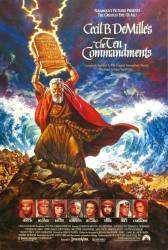Trivia: The film shows Joshua escaping and meeting up with Moses. According to holy Jewish texts, this is not so; no one could escape Egypt at the time, what with its highly occult powers. Only Moses could lead them out. And when he did lead them out, that was when Joshua went along.
Suggested correction: Joshua was exiled to a copper mine, and he escaped from there.
Other mistake: In the Bible, Moses had two sons, not one (Gershom) as depicted in the film. He had both sons in Midian before he came back to Egypt to redeem the Jews.
Revealing mistake: When Pharoah's chariots descend into the parted Red Sea to pursue the Israelites, the path before them is neatly grooved with chariot wheel tracks and not trodden with the thousands of footprints and hoof prints of humans and animals that went before them.
Suggested correction: The Hebrews had wheeled carts.
Factual error: During Moses' comeback from his Ethiopia campaign, as soon as he presents himself to Pharaoh Seti, he says, "I bring you - Ethiopia!" This is an anachronism, as Ethiopia was known as ABYSSINIA in ancient times much like Siam was to Thailand and Ceylon was to Sri Lanka.
Suggested correction: This is an example of translation convention. In real life, Moses would been speaking Egyptian or Hebrew. This is being "translated" into English for the audience in a way that they can understand. This is similar to when some Bible translations translate something like "the third day of the week" to "Tuesday." It's not incorrect, it's just translation.
Continuity mistake: At the end when Moses reaches out to the tablets, in the first shot he has nothing in his hand, second shot he has something black which at first looks like sunglasses, and in the third shot his hand is empty again.






